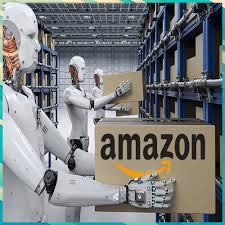The robots aren’t coming—they’ve already arrived, and they just got promoted. Amazon confirmed on Tuesday that it will slash roughly 14,000 corporate jobs, a move that reads less like cost-cutting and more like a declaration: artificial intelligence isn’t just the future—it’s management now.
For years, we’ve talked about AI reshaping logistics, marketing, and customer service. But this marks something different—the start of AI replacing the middle layers of corporate America. The quiet cubicle work. The endless spreadsheets, reports, and coordination calls that glue a massive company together. Amazon’s decision, backed by CEO Andy Jassy’s June prediction that “AI adoption will reduce total corporate workforce,” puts that conversation into motion.
Amazon isn’t exactly struggling. The company employs about 1.56 million people worldwide, with roughly 350,000 in corporate roles. So cutting 14,000 might sound like trimming fat—but it’s what’s being replaced that’s worth watching. AI tools are now writing code, generating reports, scheduling tasks, and even managing workflows faster and cheaper than their human predecessors.
And Amazon’s not alone. Across the corporate world, the pivot is accelerating. AI agents are now performing the digital drudge work once delegated to analysts, coordinators, and junior staff. The technology isn’t just about doing the same job more efficiently—it’s redefining what the “job” even is.
If the pandemic created a bubble of over-hiring, the AI boom is now correcting it with surgical precision. Reuters reported that Amazon could cut as many as 30,000 corporate roles when all is said and done, part of a broader restructuring spanning books, devices, services, and even its Wondery podcast division.
For Amazon’s investors, this move is good medicine—shares even ticked slightly higher after the news broke. But for the human side of the workforce, it’s a wake-up call. AI is no longer the assistant—it’s becoming the employee.
This shift doesn’t mean human creativity, leadership, or empathy are obsolete. It means they’re the premium skills now. Just as industrial automation reshaped manufacturing a century ago, this wave is remapping the modern office. The spreadsheet warriors are giving way to prompt engineers, system trainers, and AI ethicists.
The takeaway?
This is the start of the corporate AI takeover, and Amazon is just the first titan to say it out loud. Every major company watching this move will be taking notes ahead of their own quarterly calls. The message to Wall Street is simple: less payroll, more processing power.
For everyone else, it’s time to adapt. Learn to work with AI, or risk being the next line item “optimized” out of the org chart. The layoffs may be a headline today, but they’re really the footnote to a much bigger story: the age of artificial intelligence has officially clocked in for work.










